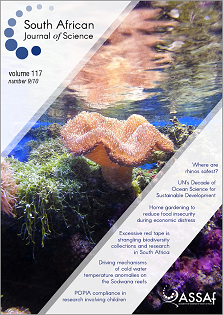Creating a climate of change in the City of Johannesburg: Co-learning to adapt to climate change
DOI:
https://doi.org/10.17159/sajs.2021/7929Keywords:
climate change adaptation planning, expansive learning, Cultural Historical Activity Theory (CHAT), co-learning, transdiciplinarityAbstract
Climate change is one of the multiple stressors facing African cities; these cities are responding by developing climate change action plans including adaptation and mitigation policies. Effectively mainstreaming climate change in city plans and operations and moving from ambition to implementation is complex. Multi-actor engagement, transdisciplinary knowledge interactions, co-designing and sustained co-learning are often required in such planning and action contexts. In this paper, we trace and reflect on the process of developing an adaptation planning process for the City of Johannesburg, South Africa. Given shortcomings of the previous adaptation responses attempted in the City, specifically that of poor uptake, we trialled a more intentional and directly designed, formative and interventionist approach using Cultural Historical Activity Theory (CHAT). We reflect on what we as a research team and City officials learnt in this process. Our findings emphasise that exploring the local context remains critical in understanding and surfacing tensions with potential climate change responses. Failure to be mindful of such issues will likely result in mere compliance, and potentially, maladaptation. Contrary to experiences in other South African settings, rather than attempting to engage all actors simultaneously, our experience suggests that working with a core group initially, before expanding the circle of actors, is needed. These actors serve as mediators and pivotal actors for learning and change, and, with appropriate authority and passion, can drive, coalesce, and potentially re-enthuse waning interest from within. They leverage already existing trust relationships and strengthen participation throughout the process. Combined, these factors are critical for ensuring implementation and legacy.
Significance:
- Careful attention to a co-designed and emergent ‘Theory of Change’ can help both the process and design of engaged climate change research and help to reframe the climate action needed in urban contexts.
- The collaborative processes we applied increased awareness and engagement between officials around issues of climate change and, in particular, climate change adaptation.
- The lessons and opportunities gathered in the miniature expansive learning journey we trialled may be useful for others trying to embark on climate change adaptation journeys in cities in Africa and beyond.
Published
Issue
Section
License

This work is licensed under a Creative Commons Attribution 4.0 International License.

All articles are published under a Creative Commons Attribution 4.0 International Licence
Copyright is retained by the authors. Readers are welcome to reproduce, share and adapt the content without permission provided the source is attributed.
Disclaimer: The publisher and editors accept no responsibility for statements made by the authors
How to Cite
- Abstract 1474
- PDF 915
- EPUB 180
- XML 183












.png)